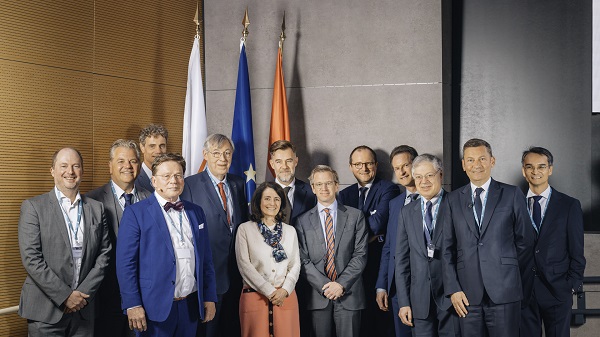 Credit: PwC
Credit: PwC
The sixteenth edition of Luxembourg’s "Journée de l'Economie" (day of the economy) took place on Monday 17 April 2023 at the Luxembourg Chamber of Commerce; over 200 participants registered to address the theme: "The current geopolitical tsunami: How can Luxembourg's and Europe's economies stay stable and secure?"
Organised by Luxembourg’s Ministry of Economy via the Luxembourg Competitiveness Observatory, the Luxembourg Chamber of Commerce and FEDIL - The Voice of Luxembourg's Industry, in collaboration with PwC Luxembourg, the conference featured Franz Fayot, Minister of the Economy, and keynote speeches by François Heisbourg, André Sapir and Augustin Landier. Two subsequent panel discussions allowed the attendees to raise their questions.
While last year’s edition of the Journée de l’Economie focused on the aftermath of the COVID-19 pandemic and the early beginnings of Russia's full-scale invasion of Ukraine, this year’s dominating topics were the geopolitical shifts and threats, notably in Taiwan and Ukraine, the consequences on the global economy and what this new uncertainty means for our values and democracies.
Carlo Thelen, Director General of the Luxembourg Chamber of Commerce, opened the conference. He underlined the importance of the diversification of the Luxembourg economy and how to use the current momentum to become an active driver for change, notably to promote the green transition and to invest in technology. He noted that the Luxembourg Chamber of Commerce believes that commercial trade should be promoted, but it has to be open, fair and support sustainable and responsible values.
Minister Fayot expressed his strong support for the need to revert to values when navigating uncertain times. He emphasised that the “Wandel durch Handel”, i.e. the change through trade principle, which was at the heart of western foreign and trade policies for decades, has backfired. Change is needed, in the way we trade, produce and consume and so, Luxembourg needs to redesign its economy and prioritise values-based trade policies. He added that, as a strong supporter of multilateralism, Luxembourg fully supports the EU’s stability and security efforts to focus more on strategic independence.
Professor François Heisbourg, Senior Adviser at the International Institute for Strategic Studies (IISS) and special advisor to the president of the Foundation for Strategic Research, then presented the impact of geopolitics in the current age. Prof. Heisbourg laid down the drivers that led to the latest transformative geopolitical changes, such as peak globalisation, the COVID-19 pandemic, the return of ideologies and imperialism, as well as the consequences these shifts have for western democracies.
After having been a keynote speaker at the Journée de l’Economie in 2019, André Sapir, economist and professor at the Solvay Brussels School of Economics & Management and Senior Fellow at Bruegel, was present once more. Through macroeconomic key indicators and microeconomics, Sapir confronted the participants with fact-based evidence of world changes. While the economy aims in the best of cases to be a positive sum game, geopolitics is a zero or even negative sum game, he noted. The geopolitical question that arises is how to work together to solve global problems, such as the climate crisis.
Augustin Landier, economist and professor at HEC, closed the keynote sessions with a speech about values and principles, and whether we are willing to pay the price for our ethical preferences. He referred to the opposition of deontology and consequentialism, and how this applies to the financial industry. Bringing all voices together and including the population, without whom the “debate will not be possible”, constitutes a key challenge for policy makers.
The organisers will once again donate all the registration proceeds from the event to charity. This year’s proceeds (about €6,000) will be given to the Fondatioun Kriibskrank Kanner (children’s cancer foundation).








